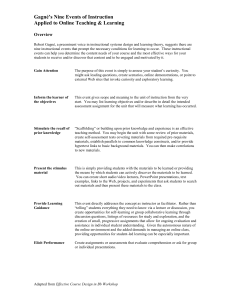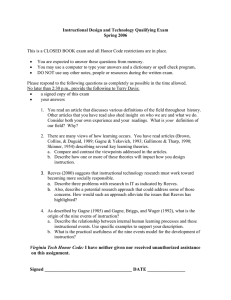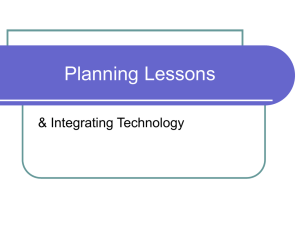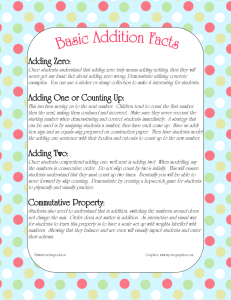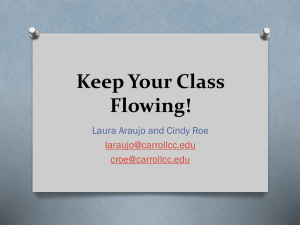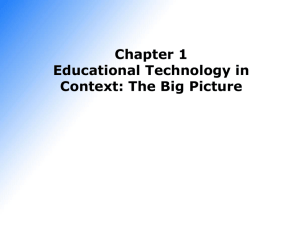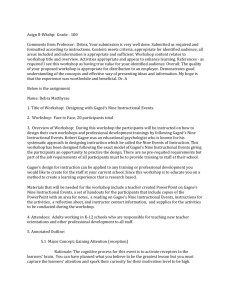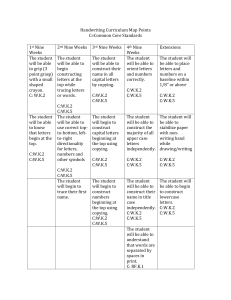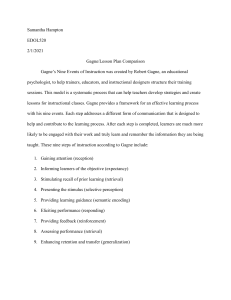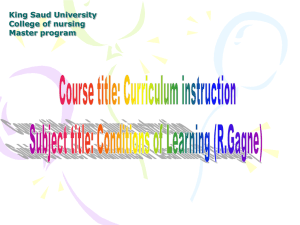Project - WordPress.com
advertisement
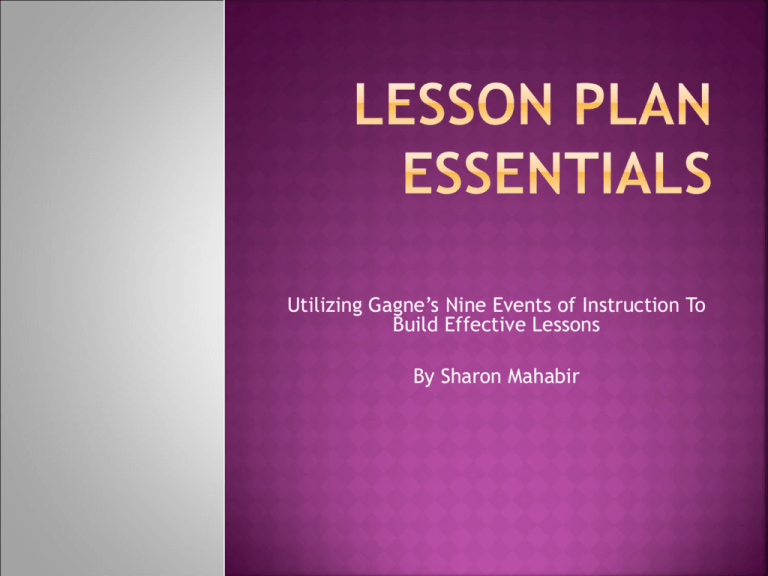
Utilizing Gagne’s Nine Events of Instruction To Build Effective Lessons By Sharon Mahabir What What makes a lesson effective? do you feel is the most important part of the lesson plan cycle? Born in Maine in 1916; died in 2002 Began developing his learning theory while serving as Director of the U.S. Air Force Perceptual and Motor Skill Laboratory Believed that the traditional methods of learning did not aid in improving training results Five Types of Learning 1. Verbal Information 2. Intellectual Skills 3. Cognitive Strategies Five Types of Learning 4. Motor Skills 5. Attitude Think-Pair-Share: Which type of learning do you feel is the hardest to develop in students? What How are they? do they fit into a lesson design plan? One Light Bulb Expert Coming Up! 1. Gain your students attention • Provides students with a stimulus to gain their attention Ask thought-provoking questions • Encourage students to develop questions to ask of each other • Utilize the element of surprise or unknown. • 2. Inform students of the objectives • Gives students opportunity to understand what they will be expected to learn • State the objectives before the instruction takes place Think-Pair-Share: What needs to be present in a wellwritten objective? 3. Stimulate the recall of prior knowledge • This event aids students in making connections to new information by relating it to prior knowledge. Questions about prior experiences • Relate previous concepts • Think-pair-share: Give one example of a method you used to activate prior knowledge. 4. Present the content • Use of differentiated instructional strategies • Organization in a meaningful way is essential • When utilizing demonstrations, it is important to provide explanations. 5. Provide learning guidance • Providing learning guidance gives students strategies to help when learning the material • Methods include: Providing instructional support • Using examples and non-examples • Demonstrate different strategies for learning • 6. Elicit Performance • Guided practice assists students in internalizing the new information. • Ideas for activities that elicit performance Student collaboration • Higher level questioning • Higher level thinking activities • Utilizing real-world applications • 7. Provide feedback • Teacher feedback gives students opportunity to correct misconceptions. • Types of Feedback • • • • • Confirmatory Corrective Remedial Informative Analytical Think-Pair-Share: What type of feedback do you use most often in your class? What are its benefits? 8. Assess performance • • • Assessment should be based on the objectives set at the beginning of lesson Assessment aids the teacher in revising the lesson and re-teaching as needed Types of assessment Pretest/post-test • Formative Assessment • Summative Assessment • 9. Enhance retention and transfer to the job • Aids students in truly internalizing the skills learned. • Lateral transfer—ability to apply learning to new situations Using Gagné’s Nine Events of Instruction, work with your table group to create an effective lesson of your choice. Explain how you will incorporate each of Gagné’s Nine Events into your lesson cycle. Ticket Out Identify one thing you have learned about Gagné and/or his Nine Events of Instruction. Identify one method/idea that you would like to include in your current lesson plan cycle this year. Amriez, S. [Shaqiss Enamenamenam]. (2013, May 21). Gagne’s Instructional Events. [Video file]. Retrieved from https://www.youtube.com/watch?v=ZKe4Og5j9Xs Denton, Jon J.; Armstrong, David G.; Savage, Tom V. Matching Events of Instruction to Objectives. Theory Into Practice. Winter80, Vol. 19 Issue 1, p10-15. Gredler, Margaret. (2009). Learning and Instruction: Theory into Practice. Columbus, Ohio: Pearson. Northern Illinois University. (n.d). Gagné’s Nine Events of Instruction. Retrieved from http://www.niu.edu/facdev/resources/guide/ Recker, M. (1996). Robert Mills Gagne’s Biography. Retrieved from http://itls.usu.edu/
